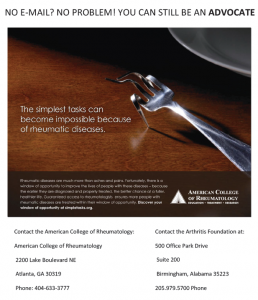
(Click for larger image)
Figure 2: Draft Paper Advocacy Flyer.
Note: Distribute this to patients who lack Internet or e-mail access. This must be modified to provide the address of your local Arthritis Foundation Chapter. The author’s is in Birmingham, Ala.
- Feel free to copy our Call to Advocacy draft (Figure 1) and put it on your own letterhead.
- Use a handout similar to the one we designed (Figure 2), called Your Insurance and Our Rheumatology Office. This helps patients understand the impact of their insurance on the care you can give.
- Consider making an alternate handout for patients who lack smartphones or Internet access that has mail addresses and phone numbers of your selected advocacy organizations (more on this in Part 2).
- Upon check-in, give every patient a copy of your advocacy letter and handout (see 3b above, Figure 2).
- When the patient is screened and has vitals done, have the staff verify that the patient has the materials. If not, provide the patient with a copy at this point.
- In the exam room, finish your visit by asking if the patient received the materials, and tell them your staff will be glad to sign them up today, if they desire.
- During checkout and while scheduling a return visit, have the staff ask if they may enroll the patient in your groups right now. It takes less than two minutes for the staff to open websites for the Arthritis Foundation and Simple Tasks to type in an e-mail address and ZIP code.
- If the patient lacks an e-mail address, give them the handout with telephone numbers and mailing addresses (Figure 2).
It’s Easy
It really is that simple. We started doing this one Monday morning after I had spent the weekend brainstorming with some colleagues. You can start this right away in your practice.
In Part 2, I will offer additional tools for advocacy that might make your efforts even more successful. Until then, I encourage you to get started and begin recruiting your army of patient advocates.
Christopher D. Adams is chief of rheumatology for the East Alabama Rheumatology Center in Auburn/Opelika. His experience includes military medical practice, health delivery logistics and planning for the military, clinical faculty at several medical schools, conducting clinical research and serving as a liaison for dialogues between the Alabama Society for the Rheumatic Diseases and managed care, as well as government entities.
